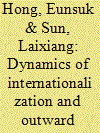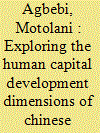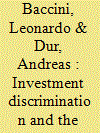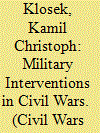| Srl | Item |
| 1 |
ID:
074815


|
|
|
|
|
| Publication |
2006.
|
| Summary/Abstract |
China's success in attracting the inflow of foreign direct investment (FDI) has been well documented. Less known is the initial success of China's "going out" strategy, which encourages domestic enterprises to participate in international capital market and to directly invest overseas. This article assesses the aggregate dynamics of China's outward FDI in a comparative prism. It traces the strategic shift of Chinese overseas investment in both arenas of government policy and corporate entrepreneurship. An emphasis is on the particularistic policies of the government and active responses of enterprises to the challenges and opportunities offered by globalization and the deepening reform. The article also discusses the strategic implications of emerging Chinese multinationals for their Western counterpart.
|
|
|
|
|
|
|
|
|
|
|
|
|
|
|
|
| 2 |
ID:
164380


|
|
|
|
|
| Summary/Abstract |
This article uses a case-study approach to discuss the effects of Chinese economic engagement on three dimensions of human capital development: local employment, training and skill building, and knowledge and technology transfer. The study findings suggests that Chinese economic engagement can and does contribute to human capital development in Africa; however, this is dependent on certain sectoral factors and contextual conditions. This study advances a working hypothesis that the human capital development impact of Chinese economic engagement will vary across countries and sectors of the African economy. This working hypothesis seeks to guide further research towards developing a theoretical framework for the study of Chinese economic engagement in Africa and its effects on human capital development. The article also identifies research areas that should be further explored in order to gain a deeper understanding of the impact of Chinese economic engagement in Africa.
|
|
|
|
|
|
|
|
|
|
|
|
|
|
|
|
| 3 |
ID:
187615


|
|
|
|
|
| Summary/Abstract |
Climate negotiations on low-carbon technology transfer have largely revolved around the role of intellectual property rights (IPR). Some countries consider a strong IPR regime to be a necessary condition for technology transfer, while others argue that it limits developing countries' access to affordable green technologies. We contribute to this discussion by assessing the effect of IPR protection on the two main channels of international low-carbon technology transfer, namely trade in low-carbon capital goods and foreign direct investment (FDI) by firms owning low-carbon technologies. Our data describe transfer through these channels among 140 countries in eight climate-friendly technology areas between 2006 and 2015. We find that stronger IPR protection in recipient countries increased transfer in six technology areas (solar PV, solar thermal, wind, heating, lighting, and cleaner vehicles), while the effect is statistically insignificant in the other two (hydro and insulation). The results differ slightly when focusing on the case of non-OECD countries. Stricter IPRs did not have a statistically significant impact on trade in low-carbon capital goods, but they accelerated FDI in almost all low-carbon technology areas.
|
|
|
|
|
|
|
|
|
|
|
|
|
|
|
|
| 4 |
ID:
139407


|
|
|
|
|
| Summary/Abstract |
The proliferation of bilateral and regional trade agreements has arguably been the main change to the international trading system since the end of the Uruguay Round in the mid-1990s. We argue that investment discrimination plays a major role in this development. Preferential trade agreements can lead to investment discrimination because of tariff differentials on intermediary products and as a result of provisions that relax investment rules for the parties to the agreement. Excluded countries are sensitive to the costs that this investment discrimination imposes on domestic firms and react by signing a trade agreement that aims at leveling the playing field. We test our argument using a spatial econometric model and a newly compiled data set that includes 166 countries and covers a period of eighteen years (1990–2007). Our findings strongly support the argument that investment discrimination is a major driver of the proliferation of trade agreements.
|
|
|
|
|
|
|
|
|
|
|
|
|
|
|
|
| 5 |
ID:
174241


|
|
|
|
|
| Summary/Abstract |
This study extends existing scholarship on the influence of corporate/industry investments on the onset of military interventions in civil wars challenging prior null findings. It proposes a state-centric theoretical framework and argues that researchers have to differentiate between the protection and the advancement of corporate/industry interests. Random-effect logit models in combination with UCDP data on interventions from 2001 until 2009 corroborate the hypothesis that the protection of existing foreign direct investments, as well as the protection of prior arms trade, increase the willingness of a state to intervene militarily in a civil war.
|
|
|
|
|
|
|
|
|
|
|
|
|
|
|
|